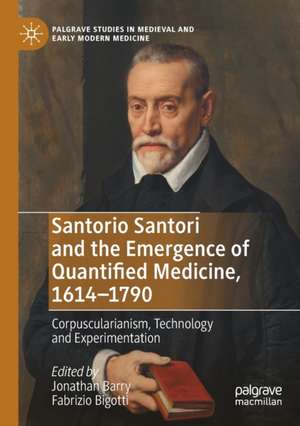Santorio Santori and the Emergence of Quantified Medicine, 1614-1790: Corpuscularianism, Technology and Experimentation: Palgrave Studies in Medieval and Early Modern Medicine
Editat de Jonathan Barry, Fabrizio Bigottien Limba Engleză Paperback – 19 mar 2023
Chapters 1 and 2 are available open access under a Creative Commons Attribution 4.0 International License via link.springer.com.
| Toate formatele și edițiile | Preț | Express |
|---|---|---|
| Paperback (1) | 730.65 lei 6-8 săpt. | |
| Springer International Publishing – 19 mar 2023 | 730.65 lei 6-8 săpt. | |
| Hardback (1) | 736.01 lei 6-8 săpt. | |
| Springer International Publishing – 18 mar 2022 | 736.01 lei 6-8 săpt. |
Preț: 730.65 lei
Preț vechi: 891.04 lei
-18% Nou
Puncte Express: 1096
Preț estimativ în valută:
139.81€ • 146.36$ • 115.68£
139.81€ • 146.36$ • 115.68£
Carte tipărită la comandă
Livrare economică 07-21 aprilie
Preluare comenzi: 021 569.72.76
Specificații
ISBN-13: 9783030795894
ISBN-10: 3030795896
Pagini: 421
Ilustrații: XXVI, 421 p. 35 illus., 23 illus. in color.
Dimensiuni: 148 x 210 x 27 mm
Greutate: 0.53 kg
Ediția:1st ed. 2022
Editura: Springer International Publishing
Colecția Palgrave Macmillan
Seria Palgrave Studies in Medieval and Early Modern Medicine
Locul publicării:Cham, Switzerland
ISBN-10: 3030795896
Pagini: 421
Ilustrații: XXVI, 421 p. 35 illus., 23 illus. in color.
Dimensiuni: 148 x 210 x 27 mm
Greutate: 0.53 kg
Ediția:1st ed. 2022
Editura: Springer International Publishing
Colecția Palgrave Macmillan
Seria Palgrave Studies in Medieval and Early Modern Medicine
Locul publicării:Cham, Switzerland
Cuprins
1. Introduction - Fabrizio Bigotti and Jonathan Barry.- 2. ‘Gears of an Inner Clock’: Santorio’s Theory of Matter and its Applications - Fabrizio Bigotti.- 3. The Uncertainty of Medicine: Readings and Reactions to Santorio between Tradition and Reformation (1615-1721) - Fabiola Zurlini.- 4. Daniel Sennert's Response to Santorio Santori in the Light of Chymical Atomism - William R. Newman.- 5. Atoms, Mixture, and Temperament in Early Modern Medicine: The Alchemical and Mechanical Views of Sennert and Beeckman - Elisabeth Moreau.- 6. Regius between Santorio and Descartes: The Quantification and Mechanization of the Passions in Seventeenth-Century Medicine - Fabrizio Baldassarri.- 7. Santorio and Leibniz on Natural Immortality: The Question of Emergence and the Question of Emanative Causation - Andreas Blank.- 8. Santorio Santori on Plague: Ideas and Experience between Venice and Naples - Vivian Nutton and Silvana D’Alessio.- 9. ‘An inquisitive man, considering when and where he liv’d’: Robert Boyle on Santorio Santori and Insensible Perspiration - Salvatore Ricciardo.- 10. Giovanni Alfonso Borelli and Santorio on the Explanation of Fevers - Fabio Zampieri.- 11. Bodies in Balance: Santorio’s Legacy in Baglivi’s Medicine - Luca Tonetti.- 12. Disputing Santorio: Johannes de Gorter’s Neurological Theory of Insensible Perspiration - Ruben Verwaal.- 13. The Influence of Santorio Santori on the Dietetics of Carl Linnaeus - Luciana Costa Lima Thomaz.- 14. Weighing Authority: Lavoisier’s and Séguin’s Reassessment of Santorio’s Experiments on Transpiration - Francesca Antonelli.
Notă biografică
Jonathan Barry is an Emeritus Professor of History at the University of Exeter, UK, and Guest Professor at LMU in Munich, Germany. He is an early modern social and cultural historian with a particular interest in the history of science, medicine and witchcraft, and co-editor of Palgrave Historical Studies in Witchcraft and Magic. He was co-founder of the Centre for Medical History at Exeter and a Wellcome Senior Investigator in Medical Humanities (2012-18) for a project on medical practice in England, Ireland and Wales 1500-1715.
Fabrizio Bigotti is an intellectual historian with a specialisation in the history of science, medicine, and technology in the late medieval and early modern period (1300-1700). His publications include works on late-Renaissance Galenism, Santorio Santori, early modern corpuscularianism and precision instruments. His work focuses particularly on the history of quantification, being more broadly concerned with the role that classical and medieval philosophies played in the development of early modern logic, theory of matter, anatomy, and physiology. He is the founding director of the Centre for the Study of Medicine and the Body in the Renaissance (CSMBR) and Research Fellow at the Institute for the History of Medicine at the Julius Maximilian University of Würzburg in Germany. Since 2018, he is also honorary research fellow at the College of Humanities of the University of Exeter, UK.
Fabrizio Bigotti is an intellectual historian with a specialisation in the history of science, medicine, and technology in the late medieval and early modern period (1300-1700). His publications include works on late-Renaissance Galenism, Santorio Santori, early modern corpuscularianism and precision instruments. His work focuses particularly on the history of quantification, being more broadly concerned with the role that classical and medieval philosophies played in the development of early modern logic, theory of matter, anatomy, and physiology. He is the founding director of the Centre for the Study of Medicine and the Body in the Renaissance (CSMBR) and Research Fellow at the Institute for the History of Medicine at the Julius Maximilian University of Würzburg in Germany. Since 2018, he is also honorary research fellow at the College of Humanities of the University of Exeter, UK.
Caracteristici
Offers the first study in English of the works and legacy of Santorio Santori, known as the father of experimental medicine Highlights the role played by medical practitioners such as Santorio in the development of corpuscularian ideas Explores how Santorio's ideas were adapted and challenged throughout the seventeenth and eighteenth centuries Chapters 1 and 2 are available open access under a Creative Commons Attribution 4.0 International License via link.springer.com









